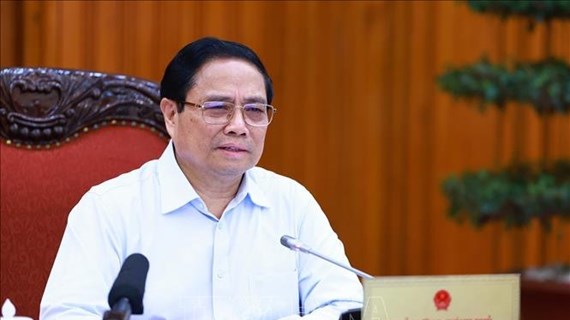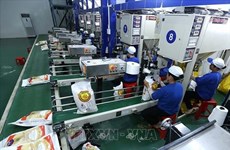How to make mobile economy prosper in Vietnam
Regarding the
development of the mobile economy, collaboration should be seen as
win-win partnerships in a value co-creation ecosystem. Vietnam Business
Forum interviewed Dr Bui Xuan Tung, Faculty Director of Vietnam
Executive MBA, University of Hawaii.
Regarding the
development of the mobile economy, collaboration should be seen as
win-win partnerships in a value co-creation ecosystem. Vietnam Business
Forum interviewed Dr Bui Xuan Tung, Faculty Director of Vietnam
Executive MBA, University of Hawaii.
* We are living in the mobile era but not everyone understands mobile business clearly. Could you talk about the basics of mobile business, and take examples of successes and failures in this kind of business?
In a classic edited book entitled "Markets of one: Creating customer-unique value through mass customization" (2000), two noted scholars James Gilmore and Joseph Pine argue that the future of the economy relies on the abilities of the businesses to serve one customer of a time. The era of mass production and mass consumption is slowly disappearing. For example, we can no longer envision a Vietnamese society that millions of customers will wear the same shirt with the same color and same style, or ride the same model of a scooter. Instead, to win competition in an increasingly sophisticated marketplace, forward-looking businesses should serve each of the customers in a way that he or she feels that he/she is the only customer that is being served providing a unique gratifying experience. A good example about this is a tailor who manages to efficiently design and create customised dresses for his/her client. There is no limited edition! There is only one product or one service each time. Today, businesses can further achieve this "market-of-one-customer" objective with mobile technology. We can reach the individual customer directly at any time and any where using mobile apps. For example, an investment banker can call his/her client through SMS or phone, or through an app to report the latest of the market whenever the event of the market calls for whether or not he is in office or traveling for business in the remote areas. Another example, a coffee shop using a GPS-based technology to connect to their frequent customers who are physically closed to one of its cafes, and send an SMS invitation: "Our Cafe in XXX would like to invite you to stop by for a coffee break with a 20 percent discount." Another more common example would be an airline sending us an SMS alerting a flight delay. These are examples of using mobile app to "uniquely" serve a customer.
A key factor for a mobile economy to take off is mobile payment. A popular business application in the USA is mobile payment provided by Square technology. Any business can use a smartphone as a tiny scanner to charge a customer anytime, any where, and the money is guaranteed to be deposit to the merchant's bank account within 24 hours with a 2.75 percent charge.
Furthermore, we need a mobile ecosystem. We need merchants, banks, internet service providers, and customers to agree on an integrated platform for financial transactions to occur. With some colleagues from Switzerland, I have done some on mobile payment there. While Octopus, an e-cash in Hong Kong, is extremely successful, Switzerland - the land of banking and high-technology, is still trying to figure out how to launch a form of mobile payment that all stakeholders are willing to adopt.
So the idea is to find out something that is unique - not only for Vietnamese users, but also for all mobile device users. I have two recommendations. First recommendation is keep observing the users (from all categories from business people to normal consumers). There are lots of daily needs that an app can assist. Another recommendation is to browse through the massive amount of apps that are now available in the markets. It is estimated that as of today there are more than 500,000 apps for the App IOS ecosystem, and more than 700,000 apps for the Android platform. Not all of them are successful, and may be there is some idea that could be modified and enhance to fit our needs. An example here is the success of the iPhone. In a view, the iPhone is a combination of a mobile phone, a portable computer, a camera, and a music player. All of these individual technologies have existed before. The iPhone success is the combination of these popular technologies in an elegant package!
* What challenges, in your opinion, are facing Vietnamese companies in the mobile economy? What solutions? Could you recommend any policies for the development of the mobile economy?
The first order of business would be to identify a real need of your customers in the Vietnam economic, social and cultural context that mobile apps can solve. Let me try with some examples. An investor would appreciate receiving timely information about an investment opportunity that just emerged a few seconds ago. A grocery shopper would want to be able to download an "e-voucher for a discount" while doing grocery shopping. A sales person can access through his/her tablet detailed information about their products at the client site to help negotiate a deal. Or an app can notify to a parent that her child has just arrived at the classroom. Also as traffic in Vietnam is getting heavier, a real-time app would notify its user the traffic situation (accident or roadwork) so that the driver can decide an alternate road.
Based on some preliminary discussions I have had with some of the colleagues doing mobile apps in Vietnam, it seems to me that we need to be more creative in finding an idea that is both technologically doable and economically feasible. Most users expect mobile apps to be free, even apps are by their very nature to be "micro-products" with small price tags. On the Apple' app store ecosystem, the average price of a paid app is 3 USD, most of them just 0.99 USD.
The second issue is to define the market segment carefully. The percentage of smart phones and tablets is still small compared to the millions of Vietnamese internet and/or 3G users. Many of the owners of smart mobile devices do not know how to take advantage of these advanced technologies. Thus, in addition to finding a mobile application that is perceived to be useful to the user, we need to develop a mobile app that is intuitively easy to use.
The technology to develop mobile apps is well advanced, and I have seen many "cute" Vietnam apps - from "Xem Tu Vi", "Giai Dap Phong Thuy" to "Co Tuong" or "Doc Sach Viet". This is a rather popular area as these apps target a read needs of customers seeking entertainments and cultural needs that are unique to the Vietnamese way of life. We need to focus on apps that improve the efficiency and effectiveness of doing business in Vietnam - apps that help production managers to improve productivity, apps that help finance and accounting officers to better manage their financial flows, apps that help salespeople to reach out to their customers more effectively, apps that help improve service to the individual customers after sales, etc.
Another major barrier to entry is the lack of angel investing in searching for "killer apps". Indeed, investment in apps can be risky. We are not sure if a new idea would be received. We need to explore way to raise investments for these projects. The good news is that development cost for mobile apps are relatively low, is most apps since the tasks are modularised. If we talk about a family of integrated apps to solve large-scale problem then the investment challenge is at a different level.
* One weakness of Vietnamese companies is cooperation. Whereas, the development of the mobile economy requires cooperation among companies in different fields in order to create an ecosystem for creative industries. How do you perceive of this situation, and recommend any solution?
Yes, as I mentioned the difficulty of launching a new mobile payment in Switzerland, we need many stakeholders to agree to work together. The need for collaboration should be seen as a win-win partnership in a value co-creation ecosystem. The good news about Vietnam is that we don't have a history of legacy systems. As we start from almost nothing, it would be easier to jump directly to a new modern ecosystem.
From the perspective of software development, most of the apps are developed and built by one, two or just a few people. A typical model is a team of two persons, a designer with a clear vision of what the app should do, and a computer programmer who can code the app. Therefore, the coordination is less of a challenge than having a large team.
* From the viewpoint of an expert, how do you assess the interest of Vietnamese community and companies to this field? Is Vietnam market attractive enough to foreign companies? How will competition among foreign and local companies be?
A natural approach to the mobile economy is to look at it as an extension to the current economy. We have an existing banking industry with its current practices. What kind of app development can we do to improve the quality of our existing banking operations? We have an existing approach to conduct our tourism industry - from hospitality management to transportation. What kind of apps can we develop to further improve our tourism industry? etc. The challenge for Vietnamese businesses is to quickly deploy mobile apps to support their customers as foreign firms are introducing apps to their customers.
* Do you have any plan or orientation to contribute to the development of the mobile economy in Vietnam?
My recommendation is that Vietnamese firms should follow carefully the evolution of apps development around the world and in the domestic market, at least in their industry. And try to look for a window of opportunity to come in.
I am pleased to see many workshops and seminars on this topic in Hanoi and Ho Chi Minh City. At our VEMBA programme, we are exploring the co-creation of a centre for entrepreneurship, innovation and technology that involves our local academic partners, our business and industry networks, and most importantly, on extensive alumni network to nurture an environment that could make a Vietnamese mobile ecosystem come to life and prosper.-VNA
* We are living in the mobile era but not everyone understands mobile business clearly. Could you talk about the basics of mobile business, and take examples of successes and failures in this kind of business?
In a classic edited book entitled "Markets of one: Creating customer-unique value through mass customization" (2000), two noted scholars James Gilmore and Joseph Pine argue that the future of the economy relies on the abilities of the businesses to serve one customer of a time. The era of mass production and mass consumption is slowly disappearing. For example, we can no longer envision a Vietnamese society that millions of customers will wear the same shirt with the same color and same style, or ride the same model of a scooter. Instead, to win competition in an increasingly sophisticated marketplace, forward-looking businesses should serve each of the customers in a way that he or she feels that he/she is the only customer that is being served providing a unique gratifying experience. A good example about this is a tailor who manages to efficiently design and create customised dresses for his/her client. There is no limited edition! There is only one product or one service each time. Today, businesses can further achieve this "market-of-one-customer" objective with mobile technology. We can reach the individual customer directly at any time and any where using mobile apps. For example, an investment banker can call his/her client through SMS or phone, or through an app to report the latest of the market whenever the event of the market calls for whether or not he is in office or traveling for business in the remote areas. Another example, a coffee shop using a GPS-based technology to connect to their frequent customers who are physically closed to one of its cafes, and send an SMS invitation: "Our Cafe in XXX would like to invite you to stop by for a coffee break with a 20 percent discount." Another more common example would be an airline sending us an SMS alerting a flight delay. These are examples of using mobile app to "uniquely" serve a customer.
A key factor for a mobile economy to take off is mobile payment. A popular business application in the USA is mobile payment provided by Square technology. Any business can use a smartphone as a tiny scanner to charge a customer anytime, any where, and the money is guaranteed to be deposit to the merchant's bank account within 24 hours with a 2.75 percent charge.
Furthermore, we need a mobile ecosystem. We need merchants, banks, internet service providers, and customers to agree on an integrated platform for financial transactions to occur. With some colleagues from Switzerland, I have done some on mobile payment there. While Octopus, an e-cash in Hong Kong, is extremely successful, Switzerland - the land of banking and high-technology, is still trying to figure out how to launch a form of mobile payment that all stakeholders are willing to adopt.
So the idea is to find out something that is unique - not only for Vietnamese users, but also for all mobile device users. I have two recommendations. First recommendation is keep observing the users (from all categories from business people to normal consumers). There are lots of daily needs that an app can assist. Another recommendation is to browse through the massive amount of apps that are now available in the markets. It is estimated that as of today there are more than 500,000 apps for the App IOS ecosystem, and more than 700,000 apps for the Android platform. Not all of them are successful, and may be there is some idea that could be modified and enhance to fit our needs. An example here is the success of the iPhone. In a view, the iPhone is a combination of a mobile phone, a portable computer, a camera, and a music player. All of these individual technologies have existed before. The iPhone success is the combination of these popular technologies in an elegant package!
* What challenges, in your opinion, are facing Vietnamese companies in the mobile economy? What solutions? Could you recommend any policies for the development of the mobile economy?
The first order of business would be to identify a real need of your customers in the Vietnam economic, social and cultural context that mobile apps can solve. Let me try with some examples. An investor would appreciate receiving timely information about an investment opportunity that just emerged a few seconds ago. A grocery shopper would want to be able to download an "e-voucher for a discount" while doing grocery shopping. A sales person can access through his/her tablet detailed information about their products at the client site to help negotiate a deal. Or an app can notify to a parent that her child has just arrived at the classroom. Also as traffic in Vietnam is getting heavier, a real-time app would notify its user the traffic situation (accident or roadwork) so that the driver can decide an alternate road.
Based on some preliminary discussions I have had with some of the colleagues doing mobile apps in Vietnam, it seems to me that we need to be more creative in finding an idea that is both technologically doable and economically feasible. Most users expect mobile apps to be free, even apps are by their very nature to be "micro-products" with small price tags. On the Apple' app store ecosystem, the average price of a paid app is 3 USD, most of them just 0.99 USD.
The second issue is to define the market segment carefully. The percentage of smart phones and tablets is still small compared to the millions of Vietnamese internet and/or 3G users. Many of the owners of smart mobile devices do not know how to take advantage of these advanced technologies. Thus, in addition to finding a mobile application that is perceived to be useful to the user, we need to develop a mobile app that is intuitively easy to use.
The technology to develop mobile apps is well advanced, and I have seen many "cute" Vietnam apps - from "Xem Tu Vi", "Giai Dap Phong Thuy" to "Co Tuong" or "Doc Sach Viet". This is a rather popular area as these apps target a read needs of customers seeking entertainments and cultural needs that are unique to the Vietnamese way of life. We need to focus on apps that improve the efficiency and effectiveness of doing business in Vietnam - apps that help production managers to improve productivity, apps that help finance and accounting officers to better manage their financial flows, apps that help salespeople to reach out to their customers more effectively, apps that help improve service to the individual customers after sales, etc.
Another major barrier to entry is the lack of angel investing in searching for "killer apps". Indeed, investment in apps can be risky. We are not sure if a new idea would be received. We need to explore way to raise investments for these projects. The good news is that development cost for mobile apps are relatively low, is most apps since the tasks are modularised. If we talk about a family of integrated apps to solve large-scale problem then the investment challenge is at a different level.
* One weakness of Vietnamese companies is cooperation. Whereas, the development of the mobile economy requires cooperation among companies in different fields in order to create an ecosystem for creative industries. How do you perceive of this situation, and recommend any solution?
Yes, as I mentioned the difficulty of launching a new mobile payment in Switzerland, we need many stakeholders to agree to work together. The need for collaboration should be seen as a win-win partnership in a value co-creation ecosystem. The good news about Vietnam is that we don't have a history of legacy systems. As we start from almost nothing, it would be easier to jump directly to a new modern ecosystem.
From the perspective of software development, most of the apps are developed and built by one, two or just a few people. A typical model is a team of two persons, a designer with a clear vision of what the app should do, and a computer programmer who can code the app. Therefore, the coordination is less of a challenge than having a large team.
* From the viewpoint of an expert, how do you assess the interest of Vietnamese community and companies to this field? Is Vietnam market attractive enough to foreign companies? How will competition among foreign and local companies be?
A natural approach to the mobile economy is to look at it as an extension to the current economy. We have an existing banking industry with its current practices. What kind of app development can we do to improve the quality of our existing banking operations? We have an existing approach to conduct our tourism industry - from hospitality management to transportation. What kind of apps can we develop to further improve our tourism industry? etc. The challenge for Vietnamese businesses is to quickly deploy mobile apps to support their customers as foreign firms are introducing apps to their customers.
* Do you have any plan or orientation to contribute to the development of the mobile economy in Vietnam?
My recommendation is that Vietnamese firms should follow carefully the evolution of apps development around the world and in the domestic market, at least in their industry. And try to look for a window of opportunity to come in.
I am pleased to see many workshops and seminars on this topic in Hanoi and Ho Chi Minh City. At our VEMBA programme, we are exploring the co-creation of a centre for entrepreneurship, innovation and technology that involves our local academic partners, our business and industry networks, and most importantly, on extensive alumni network to nurture an environment that could make a Vietnamese mobile ecosystem come to life and prosper.-VNA












